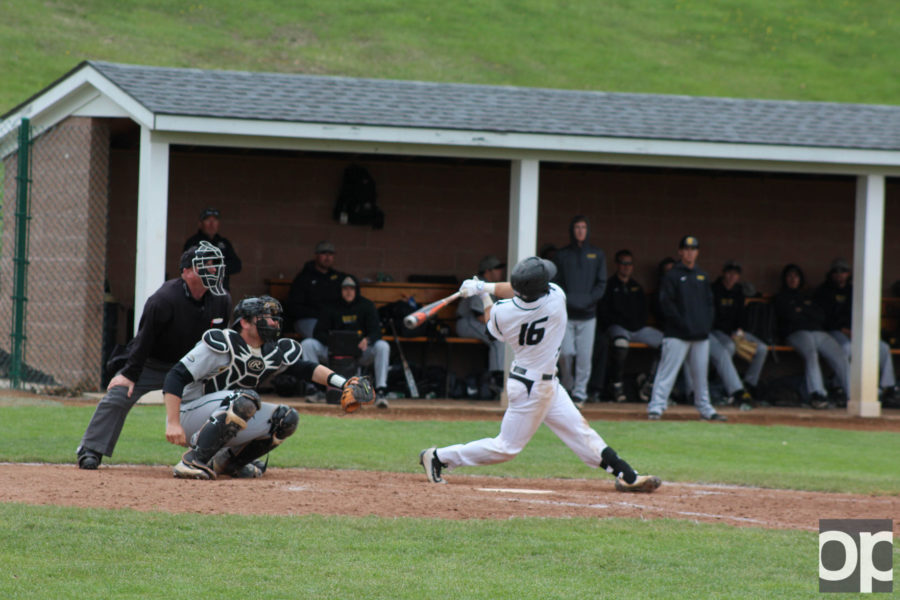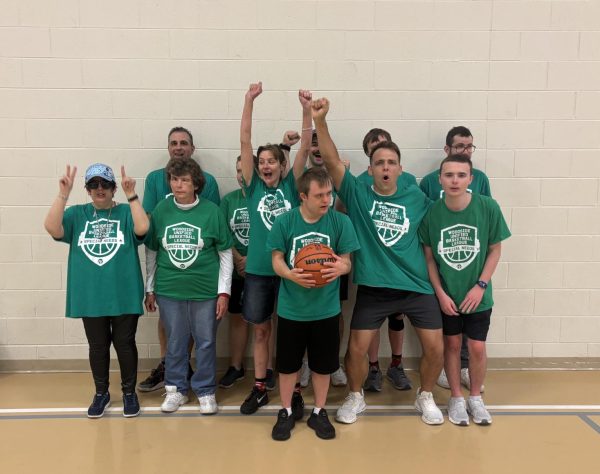The fall and rise of Ian Yetsko
Former baseball player Ian Yetsko got signed as a free agent by the United Shore Professional Baseball League, based in Utica, Mich. in June and now plays for the Utica Unicorns.
Ping. And the 31st hit of Oakland baseball’s last regular-season game of 2016 plunged into the right-center gap, scoring the walk-off run. Ian Yetsko, the author, threw his right index finger into the air. Then his helmet. Indeed, May 21 wasn’t sunny just because it was sunny.
It was the first and last time he’d ever do that for the Golden Grizzlies. Yetsko walked the field in ceremony, as would nine other seniors.
Dan Gliot, baseball information director, explained over the PA that Yetsko was escorted by his parents Lisa and Nick, his brother Aidan and Great Uncle Eddie. That he came from Dewitt, Mich. That he played in over 170 games, and he ranked in the top 10 in at-bats and doubles. He listed other feats, along with Yetsko’s favorite memory and accomplishments at Oakland.
One thing was missing.
***
January 23, 2013 (he remembers the day). Yetsko’s sophomore year at Oakland.
The team had early-morning conditioning. After that, downstairs for weights. They did deadlifts, among other exercises. In between sets, Yetsko and his lifting partner tried to see how high they could get on box jumps. Yetsko is 5-foot-9, and eventually the box was almost to his chin.
“I made it one time and tried again, and I kind of propelled myself upwards, and then landed right on the back of my head,” he said.
He barely remembers anything after that. He drifted back into consciousness in the training room. He was going to the hospital, somebody told him. Yetsko said okay, but that he didn’t know what was happening.
He woke up at Crittenton. Around him were his parents, former head baseball coach John Musachio, the Oakland trainer, and doctors. Yetsko was hooked up to some equipment.
“It was a lot to take in,” he said. Confusion plus pain.
He was in the ICU for four or five days, then the regular hospital for two.
“A lot of EKGs … MRIs, X-rays, all that jazz,” Yetsko said. “Fractured my skull in two places in the back of my head, and then had some bleeding in my brain on the right side, cause I was struggling with short-term memory for a little bit.”
He also had the worst kind of concussion. If he was in a room with lights, he’d vomit. No TV or phone. He sat in the dark. He ate little and lost 20 pounds.
“When you come to a point where you have to have nurses help you up to go to the bathroom because you can’t do it on your own….”
He redshirted spring of 2013.
***
After Crittenton, Yetsko stayed home for three weeks before he returned to school. He saw a doctor at the University of Michigan, where they gave him a rehab program to do at Oakland.
It started with bike work, then running two minutes a day, then four (the trainer had to urge him to get off the exercise equipment), and so on down the long road to resuming college baseball.
When he was in the hospital he’d been told he wouldn’t play in 2013, maybe not even 2014.
“My dad, he’s pretty much like, there’s two ways you can go about this,” Yetsko said. “You can sulk and feel sorry for yourself….”
Or it can be your motor. Yetsko chose the latter.
As rehab went on, the chances grew of him playing that fall. He ended up doing so.
“I wouldn’t have been able to do that without the support of my parents,” Yetsko said.
The short-term memory loss lasted just over six months.
***
What there any point where Ian Yetsko considered leaving baseball?
“That never crossed my mind,” he said. “I tell young guys on our team or redshirts now: I’ve been in your position. It’s going to be the most difficult year in your life.”
To watch your best friends play the sport you love and not be able to join them? Unbearable. Almost. Just enough to make you want to return that much more.
Musachio let Yetsko travel with the team the spring of 2013. Usually redshirts don’t do that.
“I’d sit in the dugout,” Yetsko said. “I had to wear a helmet.”
Foul balls. You know.
“I was just happy to be there.”
He returned to practice fall of 2013.
“My first at-bat back in the fall, Moose (Musachio) told the pitcher stay away from him, everything away from him,” Yetsko said. “First pitch, up and in. Like, turn. Everybody kinda stops. And then everybody just laughs. Welcome back.”
He hit a line drive to right field. Didn’t know how. But it was batting practice, and he wasn’t supposed to run.
“I took four quick sprint steps out of the cage,” Yetsko said. “Everybody’s like what are you doing, man? And I’m like you guys don’t get it, man. I haven’t done this in forever. I’ve been waiting for this moment for a long time.”
His teammates started clapping. Some hugged him.
The pitcher was one of Yetsko’s buddies, who later apologized for the close call. Yetsko said it was cool. But the pitch was a reminder.
“Back at it,” Yetsko said.
***
Since he came back in the fall, Yetsko had to get into fighting shape in the spring and summer of 2013. This meant two workouts and 4,000 calories a day.
“Just literally shoving food down your throat,” he said.
It was so much he’d get nauseated. His mom would say perhaps he should slow down. But he couldn’t. Baseball.
The weight training was intense. In August he lifted at home with a friend who plays lacrosse at Michigan State.
“A lot of heavy objects,” Yetsko said.
Medical professionals initially prohibited him from doing so. Progress slowly up to it, they said.
“It was a lot of legs,” Yetsko said. “In between squat sets, sprints. Different things like that.”
Yetsko still does box jumps with the team, but not to critical mass.
“I’ll be like, I don’t mess with that,” he said.
And then they laugh. Cause it’s funny. Kind of.
***
At the 2016 Black and Gold Awards, Yetsko was given the Future Leader Award.
In June 2016, he got signed as a free agent by the United Shore Professional Baseball League, based in Utica, Mich. Yetsko plays for the Utica Unicorns. Grad school is on hold, but he intends to finish his masters in communication sometime.
Doctors said his recovery was abnormally rapid.
“Sometimes I’ll get really bad headaches, and it reminds of the headaches I used to get when I was hurt,” he said. “Sometimes it’s right behind my eye. I’m like damn, this is just like it was. You know, that’s how bad it is. When you have to lay down.”
Beside that, he’s fine.
“I don’t have as strong of a sense of smell as I used to before, unless it’s right up in my face,” Yetsko said. “That’s kind of a good deal when people fart on the bus.”
***
“Here’s the bottom line,” Musachio said. “When Ian got out of intensive care, there was nothing that was going to stop Ian Yetsko from playing baseball again. And that’s his personality. This is a young man who in high school was undersized, wasn’t a very fast runner. He was average at best across the board as a junior. And he just willed himself into being a player that we had to take.”
Once his injury wasn’t life-threatening, that was Yetsko’s green light.
“He’s become one of the best leaders that we’ve ever had here,” Musachio said. “He doesn’t take a pitch off. He challenges his teammates to be better. He understands the importance of every pitch and understands the importance of being present emotionally and mentally. He’s really an old soul. He has a true understanding of the process of excellence. We love that he’s here and we’d love to have him for three more years…. He’s going to be a huge success in whatever he does, I have no doubt in my mind.”
The closest thing to Yetsko would be Justin Wilson (class of 2009), who was a freshman when Musachio was in his first year assistant coaching.
“Justin was an animal,” he said. “He was relentless.”
So, why? Why do they choose to be that way?
“I wish I knew,” Musachio said. “Cause I’d get more of them. I’d clone ’em.”
One thing is sure: Yetsko earned the chip on his shoulder.
“And I say that in a positive way,” Musachio said. “He has that edge to him where he knows he’s going to go out and get everything. He’s definitely not a guy that’s going to sit in a hammock, lay back and expect things to come to him.”
He was saying this back in May, when there were about three weeks left in the regular season. Musachio expected the exact same Ian Yetsko during the countdown.
He admitted the transition might be a little tough.
“It’s so sudden,” Musachio said. “When that last game is over, it’s over. Instantly.”
Yetsko is an emotional leader, and the finality would be a challenge. However:
“Ian has had plenty of challenges in his life that are tougher than this transition coming up, so I think Ian’s going to handle it the way he always has, and he’s going to be just fine.”
***
And there he was on May 21. Yetsko followed Tyler Pagano, who he thought would walk off, just as he had earlier in the season.
Yetsko and his roommate Brett Impemba had been talking the day before. Impemba thought the game would come down to one of them.
So Yetsko stepped into the box with bases loaded and smiled.




